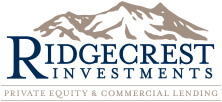How long does it take Ridgecrest to decide whether to invest in a opportunity?
If you email us a short Business Plan or Proposal describing your specific funding request and your business, we’ll give you a preliminary answer in 24 hours or less. We then institute a period of fact-finding that can last from 1 to 3 weeks, depending upon the completeness of your plans and the complexity of your funding needs. We typically make a final decision within a month. The size of the investment also impacts the time period that we need to review your funding request. Frankly, we prefer “simple” investments in business areas with which we are already familiar so that we can react fast.
How much money does Ridgecrest typically invest in a single transaction?
This depends primarily on the nature of the funding requested. When we purchase a small service business, for example, we may invest as little as $150,000, while real estate transactions can require $1,500,000 or more. However, the majority of our investments are in the $250,000 to $1,000,000 range, often invested over time.
Is Ridgecrest a lender or an equity investor?
We both lend money and purchase equity. A critical element in our equity investing, however, is our interest only in acquiring complete control of a business. Given this restriction regarding our ownership percentage, we find that most of our clients prefer to borrow money from us rather than sell equity to us.
Does Ridgecrest invest only in businesses located in the I-70, I-68 and I-81 corridors?
We consider ourselves an active partner in those businesses in which we invest, and we like to be geographically close to our partners. Our offices are in Frederick, Martinsburg, Hagerstown and Oakland, so we invest only in enterprises located in or near these cities. That said, however, several of our affiliated companies have expanded well beyond their home office.
What return does Ridgecrest expect to make on its investment?
We expect to earn approximately 10% compounded annually on an unleveraged investment or loan. For more risky equity investments, we would expect to triple our investment in five years. Our strategy is to accept a lower rate of return in exchange for a lower risk profile when compared to the returns sought by other private equity investors.
Does Ridgecrest have standard guidelines for an investment?
Each investment is different, and thus our terms differ in every transaction. As a general rule, however, we typically purchase assets rather than equity, and we expect to collect interest or a management fee as consideration for our investment. Importantly, we rarely assume existing debt or other company obligations, including employment contracts.
How actively does Ridgecrest manage its investments?
Although we provide capital to a company primarily because we respect the people managing the business and approve of their business model, we expect to be active partners with these managers. We believe that we bring expertise as well as money to any venture in which we choose to invest, and we expect management to take advantage of our experience and skills.
What can I expect Ridgecrest to do if I do not meet my Business Plan's objectives or fall behind on my loan payments?
We’ll begin by offering suggestions, but if management can’t solve the problems, we’re not opposed to replacing even the most senior people or foreclosing on a lien in order to protect our investment.
What percentage of a business does Ridgecrest normally buy or control?
We expect to be a substantial stockholder, possibly along with the business’s operating manager. We are typically the only “outside” stockholder, and we will want to own at least 75% of the business.
List some circumstances that are most conducive to Ridgecrest deciding to invest.
We invest to help businesses expand and not to help them pay off past debts. The best circumstances would be for us to invest so that the business could make an acquisition, open a new office, or expand their current product line. We expect to see a profitable business model and an experienced management team in place before we invest. An ideal investment would also enable us to leverage our expertise in an industry with which we are already familiar, such as those described elsewhere on our website.
Does Ridgecrest invest in only selected industries or situations?
We invest only in smaller companies or real estate projects. We prefer industries that reach a break-even point with 50% of their capacity filled and thus generate very high incremental profits when they fill the rest of their capacity. Just as important, our businesses must have a demonstrated and sustainable competitive advantage.
Are there industries in which Ridgecrest will not invest?
We stay away from technology ventures, and from most wholesale businesses. In service businesses, because we invest in smaller companies, we also avoid industries that could benefit significantly from economies of scale that might be available to our competition but not to a smaller business such as ours. Finally, we also avoid capital-intensive businesses or industries that are going through very rapid changes.
